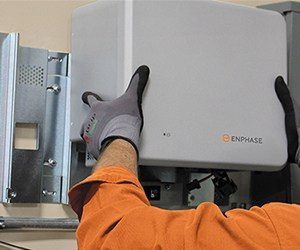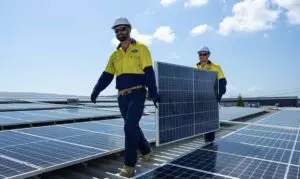A $2.2 billion scheme to fast-track battery storage uptake by Australian homes and businesses has been unveiled by the Australian Greens, in the party’s latest climate and energy policy promise ahead of the May federal election.
The scheme, which bests federal Labor’s proposed spend on households batteries by a cool $2 billion, would offer incentives of up to $7000 per battery, starting in July this year and tapering down annually to July 2023.
Crucially, 10 per cent of the $137.5 million of funding allocated each quarter would be set aside for low income households, who the Greens say would be eligible to receive double the allocated grant in that year.
The policy is also being designed to “top up” state government battery grants already being offered around the nation, such as in South Australia and Victoria.
That means that if a Victorian household received the state Labor subsidy of $4838 in 2019, they would also be eligible to receive up to $2162 from the Greens’ federal government grant.
The Greens say the key goal of the scheme is to bring the return on investment for battery storage as close to three years as possible, bringing it in line with the best payback period for rooftop solar systems.
“The opportunities presented by the huge growth in distributed energy storage will be missed if the ‘behind the meter’ technology is unable to coordinate,” the party said in a statement on Friday.
“The aggregation of home battery systems provides the opportunity to save consumers money while adding additional flexibility and security to the grid when required.”
Another key aspect of the policy design is that – to be eligible for the scheme – households will be required to install batteries that are “safe and capable” of acting in the network as a distributed energy resource, allowing them to participate in the market in roles such as a virtual power plant.
“Instead of a one-way street, our energy system needs to transform into a distributed, coordinated smart grid with battery storage at the heart of that transformation,” said Greens climate and energy spokesperson Adam Bandt on Friday.
“Seventy per cent of home owners with rooftop solar want batteries, but research indicates a lack of government incentives have inhibited the uptake of batteries. Instead of encouraging the uptake of batteries, the government is just spruiking coal.
“Our $2.2 billion plan will help households and businesses embrace and enjoy the benefits of battery storage and extra support will be given to low-income households to ensure they don’t miss out.
“Battery storage will help people reduce their energy bills while reducing demand on the network during peak times.
“Not only can distributed battery storage technology create virtual power plants, but they can almost double a household’s self-consumption from their solar panels.
“More battery storage will help Australia reach 100% renewables as soon as possible by keeping pollution and power prices down.”
This latest pre-election salvo comes at what is a heady time in Australia’s energy and climate policy debate, with the Morrison Coalition hitching its wagon firmly to coal and LNG, while upcycling some of the least impressive policies of its forebears; and federal Labor resting on the laurels of its battery storage and neighbourhood renewables programs, unveiled back in November.
Bill Shorten’s $200 million battery scheme offers a rebate of $2,000 from the cost of batteries to 100,000 households from 2020, as well as low-income loans, in a bid to foster one million household battery installations by 2025.







